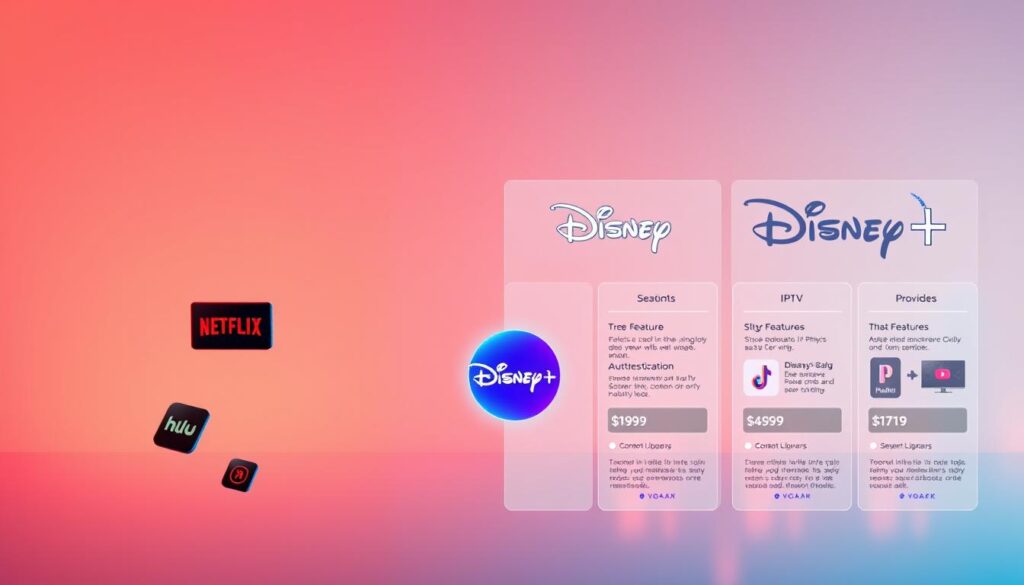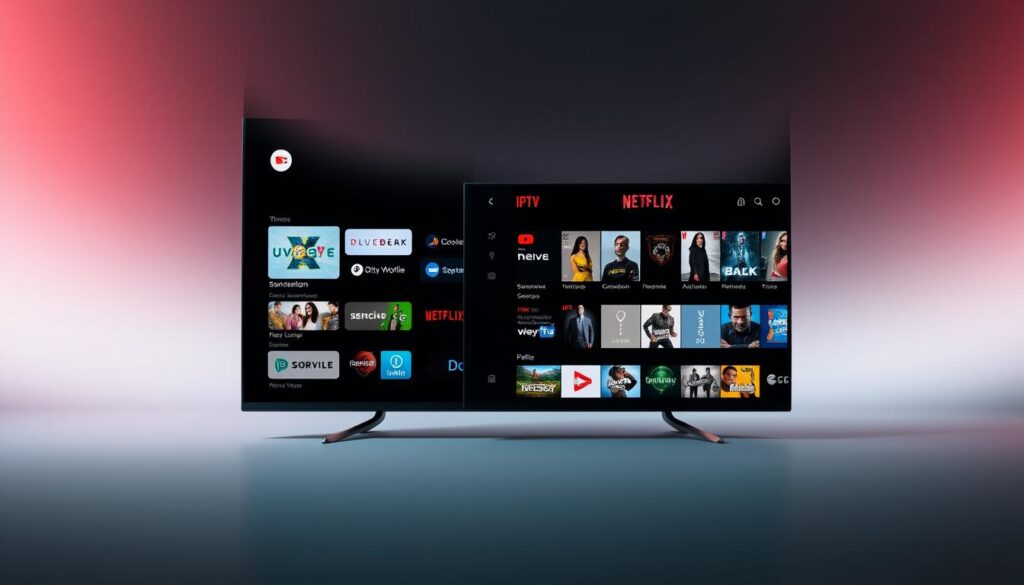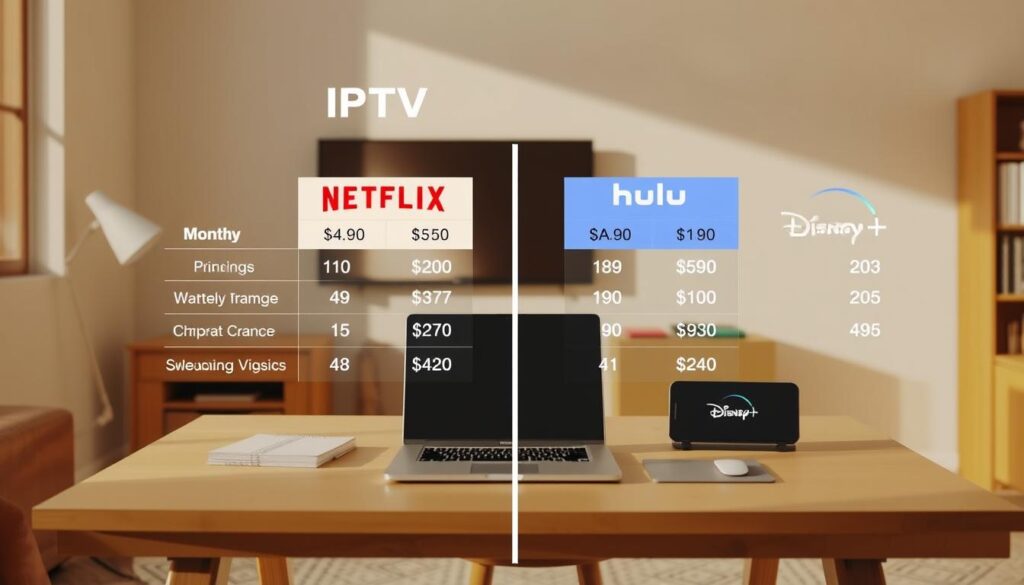Watching TV has changed a lot, with many streaming options now available. Did you know over 200 million households worldwide subscribe to streaming services? This number is expected to grow even more.
Choosing between IPTV and big names like Netflix, Hulu, and Disney+ involves several things. These include the content, price, and how easy it is to use. You can try IPTV for free with a free IPTV trial. For just $6.95, you get a whole month of premium streaming at https://GetMaxTV.com.
Key Takeaways
- IPTV offers a unique viewing experience with live TV and on-demand content.
- Popular streaming services like Netflix, Hulu, and Disney+ provide a vast library of content.
- Pricing varies between IPTV and traditional streaming services.
- User experience differs significantly between IPTV and other platforms.
- A free IPTV trial is available to test the service.
Understanding IPTV: A Quick Overview
IPTV, or Internet Protocol Television, is changing how we watch TV. It’s a new way to get TV shows and movies online. Unlike old TV, IPTV lets you pick what you want to watch.
What is IPTV?
IPTV uses the internet to bring TV to your screen. It has lots of channels and shows you can watch anytime. To learn more about IPTV and other streaming services, check out IPTV vs Streaming Services.
Key Features of IPTV
Here are some key things about IPTV:
- Variety of Channels: IPTV has lots of channels, both local and international.
- On-Demand Content: You can find a huge library of movies and TV shows to watch anytime.
- Personalization: IPTV gives you shows based on what you like to watch.
How IPTV Works
IPTV sends TV shows over the internet. This makes watching TV more flexible and fun than old TV. You can watch IPTV on many devices, like smart TVs and phones.
When you compare IPTV to Netflix or Hulu, think about what each offers. IPTV is great for watching live TV and lots of channels. It’s perfect for those who love watching their favorite shows live.
Streaming Services Explained
In today’s digital world, names like Netflix, Hulu, and Disney+ are well-known. They’ve changed how we watch entertainment, giving us lots of choices at our fingertips.
Overview of Major Players
A few big names lead the streaming market. Netflix is famous for its original shows and documentaries. Hulu has TV shows, movies, and live TV, making it a good all-around choice. Disney+ quickly became popular with its huge collection of Disney, Pixar, Marvel, and Star Wars content.
Amazon Prime Video and HBO Max also have big libraries and original content. Knowing what these services offer helps us compare them to IPTV.
Subscription Models and Pricing
Streaming services have different plans and prices to fit various needs. Here’s a quick look at the main services’ costs:
| Service | Basic Plan | Premium Plan |
|---|---|---|
| Netflix | $8.99/month | $17.99/month |
| Hulu | $5.99/month (ad-supported) | $11.99/month (ad-free) |
| Disney+ | $6.99/month | $12.99/month (with Hulu and ESPN+) |
Services sometimes offer deals and bundles, which can change their prices and value.

Device Compatibility
Streaming services are great because they work on many devices. You can watch on phones, tablets, smart TVs, and gaming consoles. This means you can watch anywhere, anytime.
Netflix works on over 4,000 devices, including Samsung and LG smart TVs and iOS and Android phones. Hulu and Disney+ also work on many devices, so you can enjoy your shows on different platforms.
Comparing Content Libraries: IPTV vs. Streaming Services
Choosing between IPTV and streaming services means looking at their content libraries. Both offer a wide range of content but in different ways.
IPTV gives users live TV and many channels, like cable or satellite TV. It has news, sports, entertainment, and educational channels. Streaming services, on the other hand, let you watch shows and movies whenever you want.
Variety of Channels and Shows
IPTV has lots of channels, local and international. This is great for those who want to keep up with their culture or international news. IPTV often has channels from all over the world, giving a diverse viewing experience.
Streaming services have a huge library of on-demand content. They don’t offer live TV like IPTV but let you watch what you want when you want. This makes it easy to plan your viewing schedule.
Original Content Offerings
Streaming services invest a lot in original content. They make high-quality shows and movies that you can’t find elsewhere. Shows like those on Netflix and Hulu are very popular.
IPTV doesn’t focus on original content but might have some exclusive content or premium channels. But, it mainly offers live TV and lots of channels.
Sports and Live Events Availability
For sports fans, IPTV is a good choice. It often has live sports channels and events. IPTV services offer sports packages with access to many sports networks.
Streaming services are also getting better at live sports and events. Some, like ESPN+ and DAZN, focus on sports. But, the live sports options vary between services.
In summary, the choice between IPTV and streaming services depends on what you prefer. It’s about the type of content, how you like to watch, and if you want live events. Knowing the differences in their content libraries helps you make the best choice for your entertainment needs.
User Experience: Interface and Accessibility
The way we watch TV has changed a lot. Now, it’s all about how easy it is to find and watch our favorite shows. This is why the user experience is so important.
Ease of Use for IPTV Services
IPTV services need special apps or devices to work. This can be good or bad. On one side, apps make watching TV easy. But, not all devices can use these apps.
For example, some IPTV services only work on certain boxes or smart TVs. This can make it hard for some people to use them. A review by Enveu says how easy IPTV is depends on the provider’s app and device support.

Streaming Services User Interfaces
Services like Netflix and Hulu have made watching TV easy. Their apps are simple to use, with shows picked just for you. A study found that Netflix’s simple design is a big reason for its success.
“The key to Netflix’s success lies in its ability to make content discovery effortless,” as stated in a report on streaming services.
This makes Netflix and Hulu easy for many people to use. They are popular because they are simple and clear.
| Feature | IPTV | Streaming Services |
|---|---|---|
| Ease of Use | Variable, depends on provider | Generally user-friendly |
| Device Compatibility | Limited by provider’s supported devices | Broad compatibility across devices |
Mobile and Smart TV Accessibility
IPTV and streaming services have improved a lot for watching on phones and smart TVs. Many IPTV apps let you watch TV anywhere. Streaming giants also have apps for smart TVs, making it easy to watch on big screens.
As GetMaxTV points out, being available on phones and smart TVs is key. This makes watching TV flexible and fun.
In the end, both IPTV and streaming services have their good points and bad points. IPTV offers a traditional TV feel but might not work on all devices. Streaming services are great for their easy-to-use apps and wide device support. What’s best for you depends on what you like watching, how easy it is to use, and what devices you have.
Internet Connection Requirements
To enjoy IPTV and streaming services without interruptions, a strong internet connection is key. Both services need a stable and fast connection to stream high-quality content.
Minimum Speeds for IPTV
The minimum internet speed for IPTV varies with stream quality. A standard definition (SD) stream needs at least 2 Mbps. High definition (HD) streams require 5 Mbps or more. For ultra-high definition (UHD) or 4K, speeds of 25 Mbps or higher are best.
IPTV services often need a more stable connection because of live content. Buffering or lag can ruin live events.
Streaming Services Bandwidth Needs
Streaming services like Netflix, Hulu, and Disney+ also have specific bandwidth needs. Netflix recommends a minimum speed of 3 Mbps for SD, 5 Mbps for HD, and 25 Mbps for UHD. Hulu suggests 3 Mbps for SD, 8 Mbps for HD, and 16 Mbps for 4K.
| Service | SD | HD | UHD/4K |
|---|---|---|---|
| Netflix | 3 Mbps | 5 Mbps | 25 Mbps |
| Hulu | 3 Mbps | 8 Mbps | 16 Mbps |
| Disney+ | N/A | 5 Mbps | 25 Mbps |
Impact of Internet Reliability on Viewing
Internet reliability is vital for a good viewing experience with IPTV and streaming services. A reliable connection means smooth content delivery without breaks.
“A reliable internet connection is the backbone of a great viewing experience, whether you’re watching IPTV or streaming services.”
Different services have different bandwidth needs, as shown in the table. Knowing these needs helps choose the best service for your internet.
When picking between IPTV and streaming services, think about your internet’s capabilities. Make sure your internet plan supports your chosen service for a better viewing experience.
Cost Considerations: A Financial Comparison
Choosing between IPTV and traditional streaming services means looking at the costs. The price is a big factor, affecting your choice based on your budget and what you like to watch.
Subscription Prices for IPTV
IPTV services have competitive prices. Prices vary by provider and the channels or packages you pick. Some charge a flat monthly fee, while others have tiered pricing for different levels of service.
Average IPTV Pricing: IPTV costs usually range from $10 to $50 a month. This depends on the service quality and content.
Monthly Costs of Streaming Services
Services like Netflix, Hulu, and Disney+ have different plans. They offer basic, standard, and premium options at different prices. A basic plan is cheaper but has fewer features. A premium plan costs more but offers more benefits.
Average Streaming Service Pricing: Monthly costs for these services range from $6.99 to $19.99. But, many people subscribe to more than one service, raising the total cost.
Hidden Fees and Add-Ons
Both IPTV and streaming services may have extra fees or add-ons. IPTV might include extra channels or premium content. Streaming services might charge for 4K streaming, ad-free, or extra screens.
| Service Type | Basic Cost | Additional Features/Add-ons | Total Possible Cost |
|---|---|---|---|
| IPTV | $10-$50/month | Extra channels, premium content | $20-$70/month |
| Streaming Services | $6.99-$19.99/month | 4K streaming, ad-free, extra screens | $10-$30+/month per service |
It’s key to understand these costs to make a smart choice. By comparing prices and add-ons, you can find the best value for your money.

Availability: Regional Limitations and Access
It’s important to know the regional limits of IPTV and streaming services. Both have limits and restrictions that affect where you can use them.
Geographic Restrictions for Streaming Services
Services like Netflix, Hulu, and Disney+ have content for certain areas. This means you might not see the same shows in different countries. It’s because of licensing and copyright laws.
For example, Netflix in the US is different from what’s in the UK or Australia. They use IP addresses to check where you are. This makes it hard to watch content not meant for your area.
IPTV Accessibility in Different Areas
IPTV also has its own limits, mainly because of channel availability. Providers offer different channels based on where you are.
The quality of your internet and local infrastructure also affects IPTV. In areas with good internet, IPTV can stream well.
How VPNs Play a Role in Access
VPNs can help get around streaming and IPTV limits. They hide your IP address, making it seem like you’re somewhere else.
For instance, a VPN can let you watch services not available in your area. But, using VPNs to dodge geo-restrictions might break some services’ rules.
For more on using VPNs with IPTV, check out IPTV VPN UK. It talks about the good and bad of VPNs with IPTV.
| Service | Regional Limitations | VPN Bypass |
|---|---|---|
| IPTV | Limited by channel and content availability | Possible with some providers |
| Streaming Services | Licensing agreements restrict content by region | Can be bypassed with VPN |
Pros and Cons of IPTV vs Streaming Services
To find the best streaming solution, we need to look at the good and bad sides of IPTV and streaming services. Both have their ups and downs, which are key to making a smart choice.
Advantages of IPTV
IPTV has many benefits, like access to live TV and lots of channels. It’s great for those who love watching live sports, news, and events.
- Live TV channels
- Variety of content options
- Potential for high-quality streaming
Also, IPTV gives a more traditional TV feel, which some people prefer.
Benefits of Streaming Services
Streaming services are top-notch for on-demand content and original productions. Netflix, Hulu, and Disney+ have tons of movies, TV shows, and unique content available anytime.
| Feature | IPTV | Streaming Services |
|---|---|---|
| Live TV | Available | Limited |
| On-Demand Content | Limited | Available |
| Original Productions | Limited | Available |
Disadvantages of Each Option
Both IPTV and streaming services have their downsides. IPTV can be hit by internet connectivity issues, and stream quality can change. Streaming services, while full of content, can cost a lot, mainly if you subscribe to many.
When comparing IPTV vs Netflix or other streaming services, think about these points. It helps make a choice that fits your viewing style and preferences.
Making the Right Choice for You
Choosing between IPTV and streaming services depends on your viewing habits, budget, and preferences. Think about the content, pricing, and user experience of both options.
Assessing Your Viewing Habits
Think about how you watch media. If you like live TV, sports, and lots of channels, IPTV might be best. For shows you can watch anytime, streaming services like Netflix and Hulu are great.
Budgeting for Entertainment
Look at the costs of IPTV and streaming services. IPTV can be cheaper, with options like GetMaxTV starting at $6.95. Think about what you get for your money in entertainment.
Final Recommendations and Tips
When choosing between IPTV and streaming services, consider what you need. Try IPTV with GetMaxTV’s free trial. By looking at your viewing habits and budget, you can choose the best option for you.
FAQ
What is the main difference between IPTV and streaming services like Netflix?
IPTV gives you live TV and lots of channels online. Streaming services, like Netflix, focus on shows you can watch anytime.
Can I access IPTV and streaming services on multiple devices?
Yes, you can watch both IPTV and streaming services on many devices. This includes phones, smart TVs, and streaming boxes.
What are the internet connection requirements for IPTV and streaming services?
You need a good internet connection for both IPTV and streaming services. IPTV needs 5-10 Mbps for standard and 25 Mbps for high definition. Streaming services like Netflix need 3 Mbps for standard and 25 Mbps for 4K.
How do IPTV and streaming services compare in terms of cost?
IPTV can be cheaper, starting at -15 a month. Streaming services like Netflix start at .99, and Disney+ at .99.
Are IPTV and streaming services available worldwide?
IPTV and streaming services might not be available everywhere. Some are global, while others are only in certain areas. A VPN can help you access more content.
Can I try IPTV before committing to a subscription?
Yes, some IPTV providers offer a free trial. This lets you try IPTV before you decide to subscribe.
What are the advantages of choosing IPTV over streaming services?
IPTV offers live TV, lots of channels, and can be cheaper. It’s a good choice if you want something different from streaming services.
How do I choose between IPTV and streaming services?
Think about what you like to watch, your budget, and what you want to see. Look at the good and bad points of each. Try a free IPTV trial if you can to help decide.
What is the best streaming solution for my needs?
The best choice depends on what you like to watch and your budget. Look at the content, prices, and how easy it is to use when choosing between IPTV and services like Netflix, Hulu, or Disney+.
How does IPTV compare to OTT streaming services?
IPTV and OTT services both stream content online. But IPTV is more about live TV and shows you watch when they’re on. OTT services are all about watching what you want, when you want.



